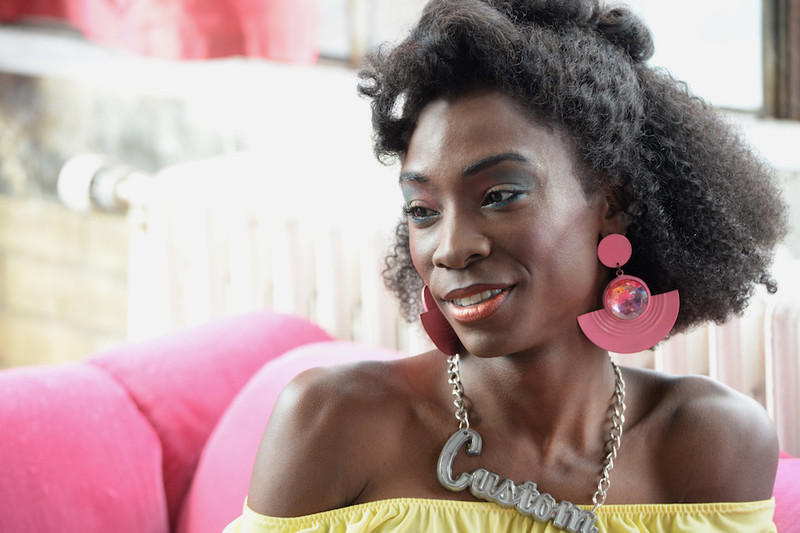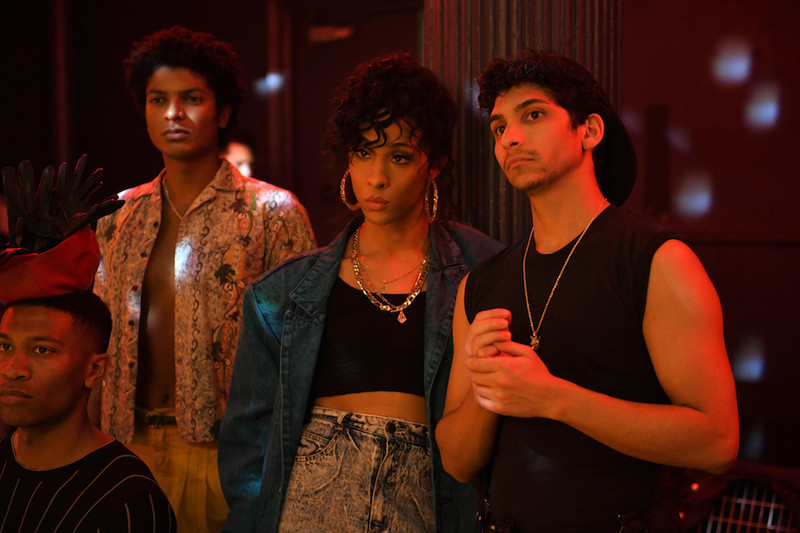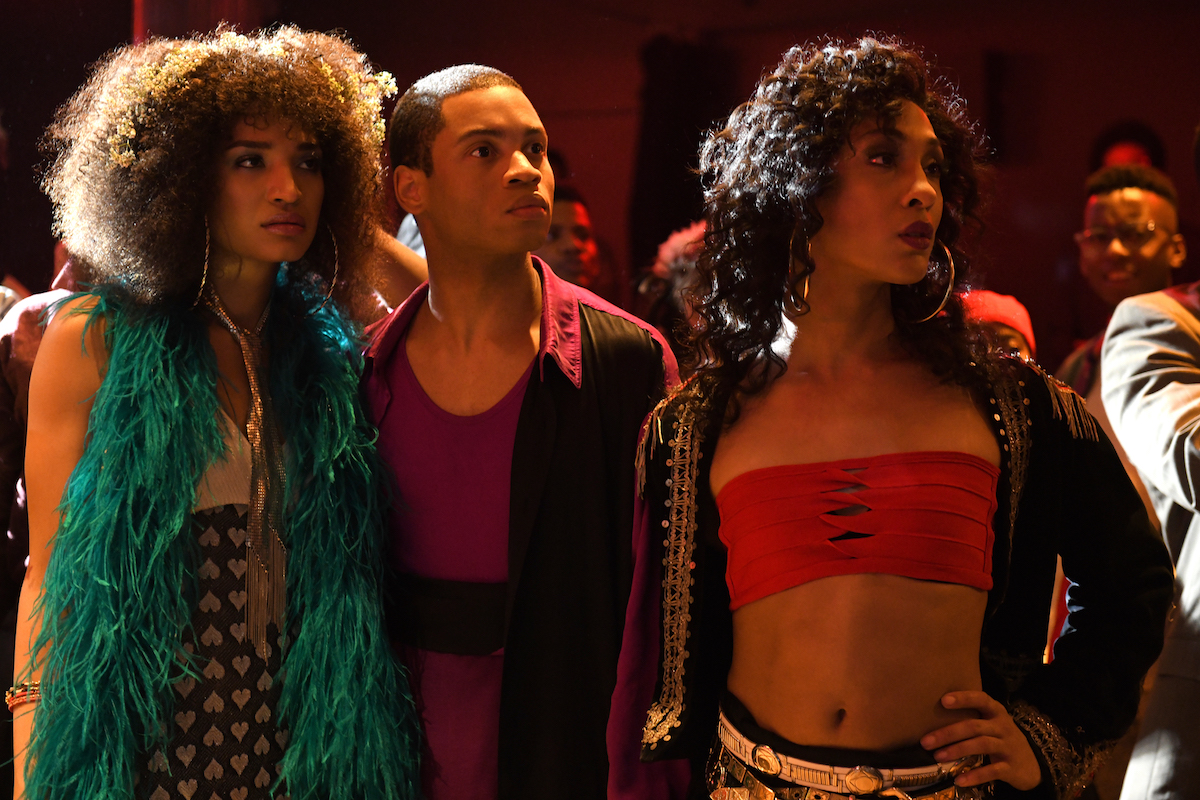There’s a scene near the end of the first episode of “Pose” when a young man auditions for an elite dance school. As it begins, it’s “Flashdance”—a row of stuffy dance experts, tucked behind featureless tables; a young person from far outside that world, nervously preparing to “dance for his life”; a song that’s personal, not formal. It’s a good scene, and feels referential, rather than derivative—but when Damon (Ryan Jamaal Swain) hits his version of the Jennifer Beals stumble, it’s an emotional moment, not a physical one. He finds a way through it, and from then on, Damon isn’t just dancing. He’s rejoicing, demanding, pleading, screaming with his body. You can see that the stiffs behind the tables fall in love. It’s beautiful, thrilling, and above all, authentic.
That scene, one of many highlights in the first half of “Pose,” neatly characterizes what the series does best, as well as underlining the nature of its slight stumbles. When it soars—and it often soars—it’s the result of authenticity. It’s there in the performances of a historic cast, in the writing, in direction that feels alternately simple and intimate, then glamorous and reverent. When the series, created by Ryan Murphy, Brad Falchuk, and Steven Canals, doesn’t quite reach those heights, it’s often for the best of reasons: a desire for more authenticity, more tributes paid, more glimpses into a corner of history often unexplored. In short, “Pose” tries, and tries fervently, to be the most honest and responsible version of itself that it could be. If it sometimes tries just a little too hard, then those missteps are both understandable and forgivable—and maybe even a little endearing.
The House of Abundance has been wronged, bested in a ball, and mother Elektra (Dominique Jackson) is determined to strike back. Blanca (MJ Rodriguez) suggests they compete together, as royalty—an idea Elektra rejects, then repackages as her own. A giddy heist follows, the members of the House of Abundance stealing finery from a museum, then evading the police just long enough to dazzle an audience before winding up in cuffs. They dodge charges, but the incident has other consequences, and Blanca departs the house to form one of her own, the House of Evangelista. Spurred in part by Elektra’s callous treatment, but more by a positive HIV diagnosis that inspires her to chase a dream, Blanca begins to bring lost and lonely people into her fold: young dancer Damon, romantic Angel (Indya Moore), and jubilant but risk-taking Lil Papi (Angel Bismark Curiel), for a start. The story spirals outward from there, tracing Damon’s dance career under teacher Helena St. Rogers (Charlayne Woodard), Angel’s troubled relationship with a rising star at the Trump Organization (Evan Peters) who has a wife (Kate Mara) and kids at home, and Blanca’s friendship with designer and ball emcee Pray Tell (Tony winner Billy Porter).

If that sounds like a lot of story, it is; that brief summary barely scratches the surface. “Pose” uses the rivalry between the Houses of Abundance and Evangelista as a framework on which the quieter, more intimate stories hang. The ball scenes are among the show’s purest pleasures, rich in color and life, but with a few exceptions, they’re also a bit peripheral. “Pose” does such a good job of investing in the emotional lives of its characters that not even these extravagant, giddy displays can compete. The exceptions prove the rule: in episode four, the balls prompt Elektra and Candy (Angelica Ross) to ask questions about what “realness” means to them, and their entwined storylines help to ground the episode, and its ball scenes in particular, in something affecting and thematically rich.
But there’s a story outside the world of the balls and those who compete in them, and it’s in those scenes that “Pose” feels most off-balance. Peters and Mara are both excellent, and Peters’ scenes with the subtle, quietly charismatic Moore are among the series’ best. But while they’re entertaining and audacious, the infrequent appearances of a coke-snorting, cash-waving Trump executive (played with gusto by James Van Der Beek) feel less like bonus material and more like holdovers from some other series. It’s refreshing, to be honest, to have the hypermasculine white guy seem out of place, but not even Van Der Beek’s engaging performance makes these scenes of ‘80s excess a worthy distraction. At best, they’re entertaining distractions, but at worst, they feel derivative and insincere, right down to a subplot ripped straight from the first season of “Mad Men.”

But none of those distractions, big or small, can diminish the effect of the whole, and that effect is both moving and winning. Much of that is due to the performances, many given by actors relatively unknown. Murphy and FX have proudly called this ensemble the largest cast of transgender actors in television history, and that alone is worth celebrating. That they acquit themselves so well makes clear that putting in the effort to find actors who can represent their own communities results in art that’s deeply affecting and thoughtful. Rodriguez makes a strong start as the idealistic and determined Blanca, and only gets better as the season progresses; in lesser hands, she might seem blandly inspiring, but Rodriguez and the show’s writers ensure that she’s much more than that. Like Rodriguez, Moore gives Angel seemingly incalculable depths. In a scene with Peters’ Stan, Angel dissects the idea that she should demand better for herself than a life as a “kept woman,” and the wonder of Moore’s performance is that the bitterness and foreboding of that exchange doesn’t dim the later joy of watching her face light up when she sees Stan.
They’re all good—Ross gives Candy a palpable intelligence, Swain is a star in the making, and while Jackson tends to hit the same notes over and over again early on, her performance gains subtlety as the writers give Elektra more to do than deliver wicked barbs and wear incredible costumes (by frequent Murphy collaborator Lou Eyrich). But even in this excellent cast, the standout has to be Porter, whose fathoms-deep well of charisma gets as much of a workout as his capacity for empathy. As Pray Tell, Porter walks a fine line, balancing acidic shade, warm inspirational speechifying, and, oh, say, subtle but nearly constant confrontations with mortality. Somehow, it’s a line he walks with ease, resulting in one of the best television performances of the year; if there’s any justice in the awards world, we’ll be talking about it next Emmy season.

Porter, Rodriguez, Swain, and the rest of the cast are so effective in their roles that it makes it very easy to overlook the little missteps that occasionally bog the series down. It’s understandable that Murphy, Falchuk, Canals, and their writers would want to pay tribute to the non-fictional performers and artists who populated the ball scene in the ‘80s and early ‘90s, and it’s fitting that they do so. Some of those tributes, such as appearances by members of the House of Xtravaganza, are subtle and sweet. Others, particularly lines of dialogue that explicitly reference the 1991 documentary “Paris is Burning,” get less effective as the series goes on. When it occasionally feels like referential hand-holding, it’s easily forgiven, though if “Pose” continues to spend a significant percentage of its time paying tribute, rather than telling stories, it will be to the show’s detriment.
Still, “Pose” makes an admirable commitment to putting the desires, fears, and struggles of its characters at the center of a story in which it would be easy to get distracted by the disco balls and couture. It was ostensibly meant to be a show about a culture—a culture appropriated or paid homage to, depending on your perspective—by artists like Madonna for decades, with a language now embedded in the pop culture landscape thanks to “RuPaul’s Drag Race” and other shows and films. That it resists the urge to be the big thing in favor of being the small, intimate thing is laudable, and if we get some glitter and rhinestones on the side, so much the better.












